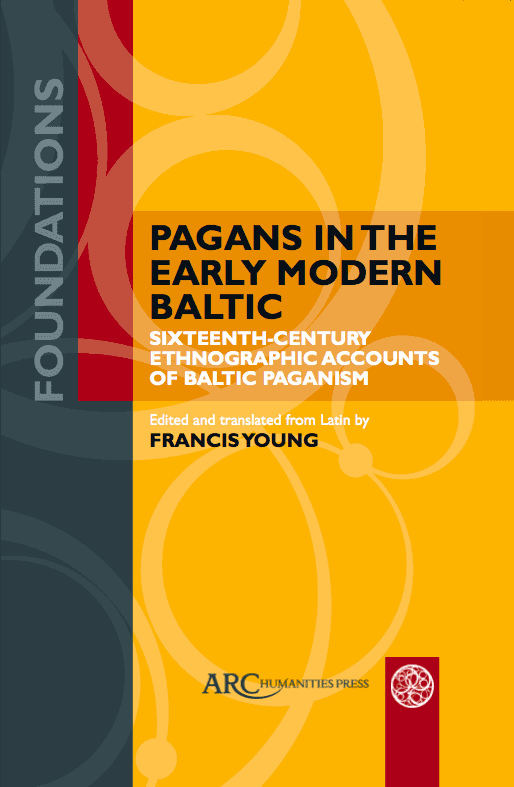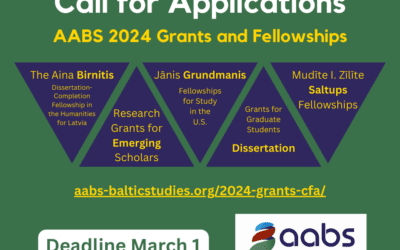The AABS Board is pleased to announce that Arc Humanities Press has been awarded the AABS Book Publication Subvention for publishing “Pagans in the Early Modern Baltic: Sixteenth-Century Ethnographic Accounts of Baltic Paganism.” The book, authored by English historian Francis Young, is the first translation into English of the key Latin texts written between around 1450 and 1580 about the religion, culture and language of the Balts, at a time when paganism was still a living reality in the Baltic region.

©Francis Young, 2022
The Impact of an Award: Report from Francis Young
After the publication of Pagans in the Early Modern Baltic on April 12,
Francis Young submitted the following to AABS.
We thank him for his permission to publish his thoughts here.
I am very grateful to the AABS for the award of the annual Book Publication Subvention to Pagans in the Early Modern Baltic, which was published on 12 April 2022, and I take this opportunity to express my appreciation of the AABS for its support for my book. As a consequence of the award, Arc Humanities Press was able to reduce the price at which the book was offered for sale, and was also able to offer me an additional paperback contract for the book, which will see a paperback edition published a few months after the hardback edition. Furthermore, the publisher offered to include a frontispiece illustration for the book (from Sebastian Münster’s Cosmographia), which would not otherwise have been affordable. The award of the Book Subvention assisted me in promoting the book, and my promotion of the book on social media (especially Twitter) has consistently received strong engagement, suggesting there is a public appetite for a volume in English on Baltic paganism. The translator of the Lithuanian summary, Saulė Kubiliūtė, has also made an important contribution to sharing news of the book’s publication by promoting it to Lithuanian-speaking academic and non-academic audiences.
My book was the subject of an article in The Baltic Review on 25 February 2022 (‘Introducing Baltic paganism to the English-speaking world’) and I authored a blogpost for Arc Humanities Press about the book that was published on 18 April 2022. The press was able to introduce a 40% discount on the book that is available until 24 June 2022 (code: PEMA40).

In late 2021 I approached the Lithuanian Embassy in London about the possibility of their hosting an online book launch for Pagans in the Early Modern Baltic, and I met with officials at the Embassy in January 2022 to discuss the plan. Over the next few months we determined a format for an online launch, which took place on 31 May. The launch was introduced by the Ambassador of Lithuania to the United Kingdom, Renatas Norkus, and was chaired by Dr Pavel Horák of Cambridge University. After I introduced the main themes of the book, Professor Vytautas Ališauskas of Vilnius University and Dr Toms Ķencis of the University of Latvia responded with their reflections on the book, before the discussion was opened to people participating via Zoom and YouTube.
The Russian invasion of Ukraine and Russia’s threats against the Baltic states have sharpened many scholars’ awareness of the urgency of communicating the history and culture of East-Central Europe to a Western European and North American public to whom the region is still largely unknown. I was heartened to see that the publication of my book quite closely coincided with the publication of a book on a similar theme in France, Les derniers païens (‘The Last Pagans’) by Sylvain Gouguenheim (a book of which I was unaware until its publication); it feels as though Baltic paganism’s moment has arrived as a subject of wider public awareness beyond the Baltic states.
What is the AABS Book Publication Subvention?
The AABS awards its Book Publication Subvention of up to $5,000 for individually authored books, edited volumes, and multiple-authored books in English that make a substantial scholarly contribution to Baltic Studies. The applications must be submitted by publishers, not authors. Priority will be given to single author’s first monographs.
AABS awards two Book Publication Subventions each year. Applications may be submitted for review anytime, on a rolling basis.
Other Grants and Fellowships News
Vanished Lands: Book Publication Subvention Report by Laima Vincė Sruoginis
The Association for the Advancement of Baltic Studies (AABS) is pleased to recognized the successful conclusion of a Book Publication Subvention Grant awarded to Peter Lang Publishers for publishing the book Vanished Lands: Memory and Postmemory in North American...
Elīna Vikmane Birnitis Fellowship Report on Advancing Cybermuseology
AABS is pleased to recognize Elīna Vikmane for the completion of her dissertation "Advancing Cybermuseology: Diffusion of digital innovation in Latvia’s museum sector," for which she received the 2022–2023 Aina Birnitis Dissertation-Completion Fellowship in the...
AABS 2024 Grant and Fellowship Applications Open
Call for Applications AABS 2024-2025 Grants and Fellowships Research Grants for Emerging Scholars The Aina Birnitis Dissertation-Completion Fellowship in the Humanities for Latvia Mudīte I. Zīlīte Saltups Fellowships Jānis Grundmanis Fellowships for...



